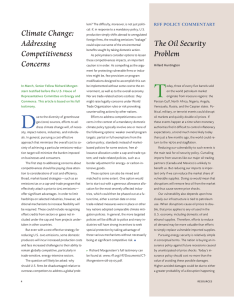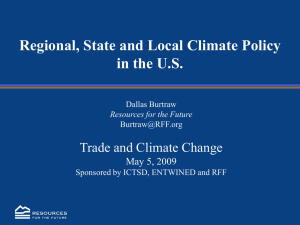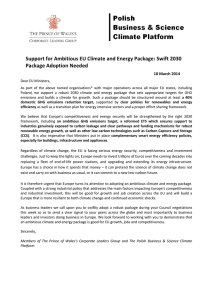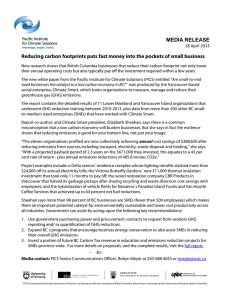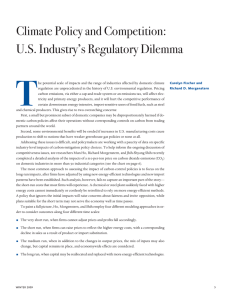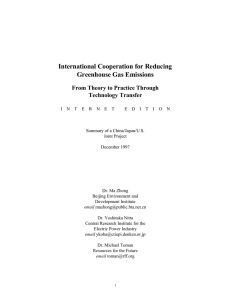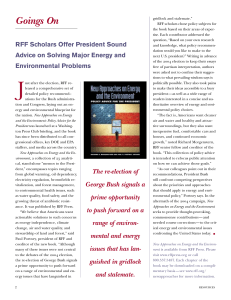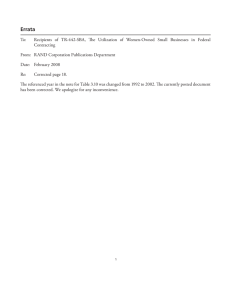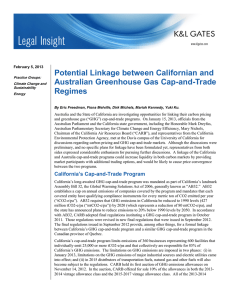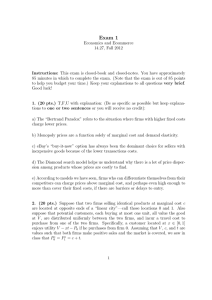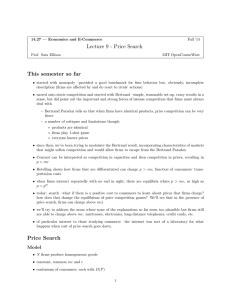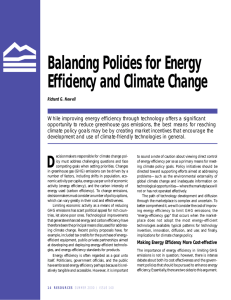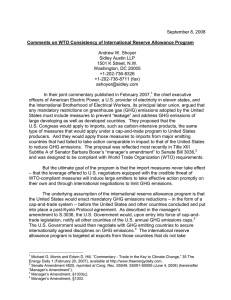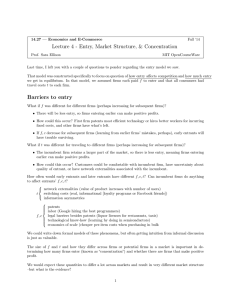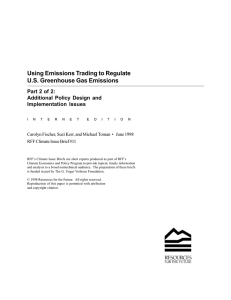lem? The difficulty, moreover, is not just politi-
advertisement
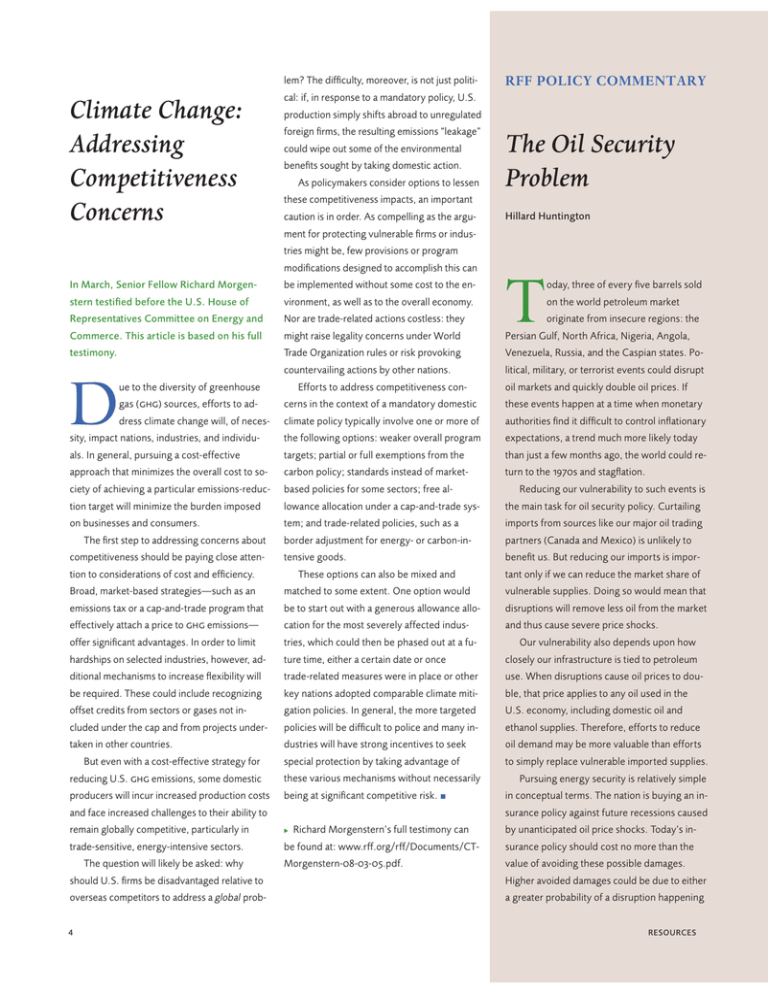
lem? The difficulty, moreover, is not just politi- Climate Change: Addressing Competitiveness Concerns In March, Senior Fellow Richard Morgenstern testified before the U.S. House of Representatives Committee on Energy and Commerce. This article is based on his full testimony. D ue to the diversity of greenhouse gas (ghg) sources, efforts to address climate change will, of necessity, impact nations, industries, and individuals. In general, pursuing a cost-effective approach that minimizes the overall cost to society of achieving a particular emissions-reduction target will minimize the burden imposed on businesses and consumers. The first step to addressing concerns about competitiveness should be paying close attention to considerations of cost and efficiency. Broad, market-based strategies—such as an emissions tax or a cap-and-trade program that effectively attach a price to ghg emissions— offer significant advantages. In order to limit hardships on selected industries, however, additional mechanisms to increase flexibility will be required. These could include recognizing offset credits from sectors or gases not included under the cap and from projects undertaken in other countries. But even with a cost-effective strategy for reducing U.S. ghg emissions, some domestic producers will incur increased production costs and face increased challenges to their ability to remain globally competitive, particularly in trade-sensitive, energy-intensive sectors. The question will likely be asked: why should U.S. firms be disadvantaged relative to overseas competitors to address a global prob4 RFF POLICY COMMENTARY cal: if, in response to a mandatory policy, U.S. production simply shifts abroad to unregulated foreign firms, the resulting emissions “leakage” could wipe out some of the environmental benefits sought by taking domestic action. As policymakers consider options to lessen these competitiveness impacts, an important caution is in order. As compelling as the argument for protecting vulnerable firms or industries might be, few provisions or program modifications designed to accomplish this can be implemented without some cost to the environment, as well as to the overall economy. Nor are trade-related actions costless: they might raise legality concerns under World Trade Organization rules or risk provoking countervailing actions by other nations. Efforts to address competitiveness concerns in the context of a mandatory domestic climate policy typically involve one or more of the following options: weaker overall program targets; partial or full exemptions from the carbon policy; standards instead of marketbased policies for some sectors; free allowance allocation under a cap-and-trade system; and trade-related policies, such as a border adjustment for energy- or carbon-intensive goods. These options can also be mixed and matched to some extent. One option would be to start out with a generous allowance allocation for the most severely affected industries, which could then be phased out at a future time, either a certain date or once trade-related measures were in place or other key nations adopted comparable climate mitigation policies. In general, the more targeted policies will be difficult to police and many industries will have strong incentives to seek special protection by taking advantage of these various mechanisms without necessarily being at significant competitive risk. ∫ † Richard Morgenstern’s full testimony can be found at: www.rff.org/rff/Documents/CTMorgenstern-08-03-05.pdf. The Oil Security Problem Hillard Huntington T oday, three of every five barrels sold on the world petroleum market originate from insecure regions: the Persian Gulf, North Africa, Nigeria, Angola, Venezuela, Russia, and the Caspian states. Political, military, or terrorist events could disrupt oil markets and quickly double oil prices. If these events happen at a time when monetary authorities find it difficult to control inflationary expectations, a trend much more likely today than just a few months ago, the world could return to the 1970s and stagflation. Reducing our vulnerability to such events is the main task for oil security policy. Curtailing imports from sources like our major oil trading partners (Canada and Mexico) is unlikely to benefit us. But reducing our imports is important only if we can reduce the market share of vulnerable supplies. Doing so would mean that disruptions will remove less oil from the market and thus cause severe price shocks. Our vulnerability also depends upon how closely our infrastructure is tied to petroleum use. When disruptions cause oil prices to double, that price applies to any oil used in the U.S. economy, including domestic oil and ethanol supplies. Therefore, efforts to reduce oil demand may be more valuable than efforts to simply replace vulnerable imported supplies. Pursuing energy security is relatively simple in conceptual terms. The nation is buying an insurance policy against future recessions caused by unanticipated oil price shocks. Today’s insurance policy should cost no more than the value of avoiding these possible damages. Higher avoided damages could be due to either a greater probability of a disruption happening RESOURCES
